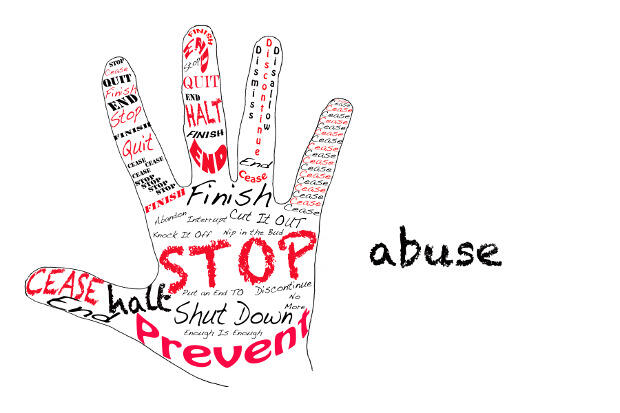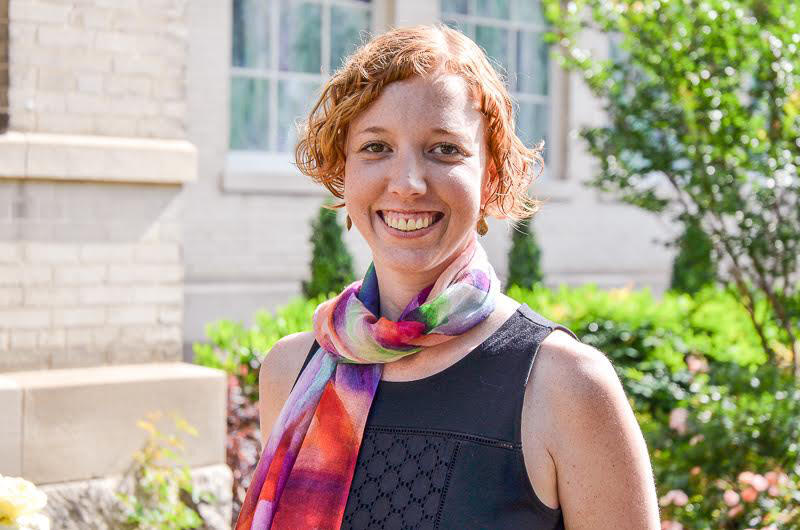
Oct. 19, 2017
VCU and VCU Health raise awareness of campus resources during Domestic Violence Awareness Month
Kaylin Tingle, the LGBTQIA+ violence prevention specialist and advocate at The Well, discusses the importance of addressing and defining domestic violence and intimate partner violence.
Share this story
Between the Virginia Commonwealth University Wellness Resource Center, the VCU Health Injury Violence and Prevention Program and other university departments, the campus community is taking a well-rounded approach to highlight services, options and opportunities for students and faculty during Domestic Violence Awareness Month. Throughout October, community lectures and an employee “Wear Purple Day” on Oct. 19 are scheduled across the VCU and VCU Health campuses. Purple is the color used to denote Domestic Violence Awareness Month.
At 7 p.m. on Oct. 25, Project EMPOWER coordinator, Maria Altonen, is presenting on “The Role of the Pre-Hospital Provider in Domestic Violence and Human Trafficking” at the Richmond Ambulance Authority. Project EMPOWER is under the IVPP umbrella and is a multidisciplinary initiative dedicated to enhancing prevention and intervention services for individuals who experience intimate partner or sexual violence. An Anti-Violence Resource Expo will take place Oct. 24 from 11 a.m. to 2 p.m. on the Monroe Park Campus in the Commons Virginia Rooms C and D. And Project EMPOWER and the HelpLink Employee Assistance Program will host a training, “The Role of Hospital Providers in Supporting Those Experiencing Domestic Violence,” on Oct. 31 from 12-1 p.m. in The Learning Center inside VCU Medical Center.
Kaylin Tingle is the LGBTQIA+ violence prevention specialist and advocate at The Wellness Resource Center. Domestic violence is a sensitive topic, particularly on a college campus, she said, but needs to be addressed proactively and reactively. VCU News spoke with Tingle about the importance of using this month to be vocal about making intimate partner violence visible, as well as the options and opportunities continually available to survivors and families at VCU.

What are the sexual assault and intimate partner violence and stalking advocacy services offered by The Well?
The Well offers confidential advocates for students who have experienced sexual assault, intimate partner violence, stalking, and hate- and bias-motivated violence. Students who are friends and family members of survivors of violence are also welcome to meet with advocates. The confidential advocates at The Well support students by listening to them, believing them, and referring them to appropriate resources on and off campus. Advocates support survivors by helping them explore their options, such as reporting to the Title IX office, having evidence collected through a PERK exam, seeking protective orders, safety planning, disclosing to loved ones, obtaining shelter, and accessing long-term support. The advocates at The Well also provide prevention and education for the student population. We encourage discussions on campus about bystander intervention and ways that the entire community can work towards preventing violence. We also facilitate discussions on recognizing and responding to violence, and practicing consent, healthy sexuality and healthy relationships.
|
The Well advocates are available to see students with or without appointments during normal business hours, Monday through Friday 8:30 a.m. to 5 p.m. at 815 S. Cathedral Place. Students can make an appointment by emailing MyOptions@vcu.edu or calling 804-828-9355 (VCU-WELL). More information is also available at www.thewell.vcu.edu and by following @thewellvcu on Facebook, Instagram and Snapchat. |
Why is domestic violence such an important issue for college students?
Many college students are living on their own for their first time and may be exploring new ways of engaging in intimate relationships. Relationships rarely start off abusive, but over time a partner can exhibit possessiveness, manipulation and control, leaving their partner feeling powerless and isolated from support. Some college students may be especially vulnerable to isolation if they are away from home and their support networks. The term “domestic violence” is often used to describe violence between cohabitating partners or family members. We tend to use the term “intimate partner violence” or IPV to recognize the ways that violence plays out within intimate relationships beyond people who are married, living together or share children. According to a recent survey of 27 institutions for higher education by the Association of American Universities, one in 10 students who had been in partnered relationships had experienced IPV since enrolling in college.
Among college students, what have you found is the most difficult thing about identifying domestic violence?
Intimate partner violence also involves tactics that are more subtle than those that result in bruises, black eyes and broken bones.
When many people think of domestic or intimate partner violence, they think of physical violence. While this is an important piece of the puzzle, it is far from the whole picture. Intimate partner violence also involves tactics that are more subtle than those that result in bruises, black eyes and broken bones. Manipulation, possessiveness, isolation and threats are some of the more covert strategies abusive partners use to maintain power and control in relationships. Emotional and verbal abuse are tools that can chip away at a survivor's self-esteem, leaving them thinking that they are not worthy of healthier relationships, questioning their reality or sanity and feeling powerless. The normalization of violence in our culture, and in particular violence against women, people of color, LGBTQIA+ people, and people with disabilities, makes identifying abuse difficult.
Among college students, what have you found is the most difficult thing about reporting domestic violence?
Friends and loved ones of people surviving intimate partner violence often want to know, “Why don’t they just leave?” It's a complicated question. First, it puts the onus on the victim/survivor of abuse, rather than the person perpetrating it. As a society we must shift the focus from victims and potential victims to abusers. We must question their motives and behaviors, not those of the person who is surviving the abuse. The tactics used by abusive partners make it difficult for people surviving intimate partner violence to reach out for help. They may be isolated and not know where to go, or not have access to resources. For example, their access to transportation or forms of communication may be limited or monitored. They may not define what is happening to them as violence. When the narrative of intimate partner violence is limited to acts of physical violence, it is difficult for survivors to name what they are experiencing when it doesn’t fit that narrative. They may see it as “not that bad” or may believe that they are contributing to it or doing something to deserve being treated that way.
What can a student expect if they come to the The Well for help?
When students come to The Well, they can expect to meet with a confidential advocate who will believe and support them. We work alongside survivors, fighting with them and for them to overcome the challenges they are facing and to help them access the resources they determine are needed to move forward. We often use the analogy of a GPS when we work with students: they are driving the car, and we [advocates] are like a GPS. They say they want to go to the grocery store, we tell them which grocery stores they can choose from. We ask them if they want to take a route with tolls or the scenic route. If they decide they want to stop and get food on the way, we'll add a stop to the route. If we get to the grocery store and they decide they want to go to a different one, we redirect the trip. We are here to work on behalf of the survivor and help them plan for safety and healing in the ways they define.
Subscribe for free to the VCU News email newsletter at http://newsletter.news.vcu.edu/ and receive a selection of stories, videos, photos, news clips and event listings in your inbox every Monday and Thursday during the academic year.
Subscribe to VCU News
Subscribe to VCU News at newsletter.vcu.edu and receive a selection of stories, videos, photos, news clips and event listings in your inbox.












